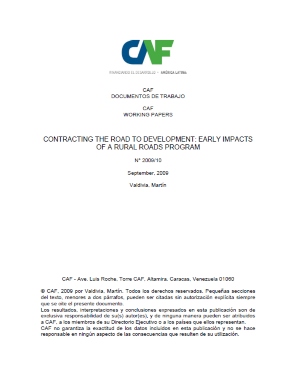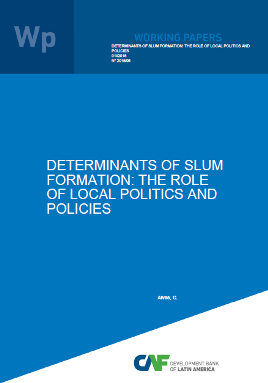| dc.contributor.author | Valdivia, Martín | es |
| dc.coverage.spatial | Perú | es |
| dc.date.accessioned | 2014-10-15T20:04:11Z | |
| dc.date.available | 2014-10-15T20:04:11Z | |
| dc.date.issued | 2009 | es |
| dc.identifier.citation | Valdivia, M. (2009). Contracting the road to development: early impacts of a rural roads program. CAF Working paper, 2009/10, Caracas: CAF. Retrieved from https://scioteca.caf.com/handle/123456789/203 | en |
| dc.identifier.uri | https://scioteca.caf.com/handle/123456789/203 | |
| dc.description.tableofcontents | We studied here the early impacts of the Peruvian rural roads program (RRP) that is characterized by the contracting of private local firms for the rehabilitation and maintenance of rural roads with local supervision by community leaders setting incentives that favour prevention activities and a sustainable and timely maintenance of rural roads. We find that this institutional innovation improved road transitability which in turn led to increased income, change in employment patterns and increased investments in education and health, although they differ greatly by the characteristics of the individual, household, villages and treated road. In particular, it is interesting to find that early income effects accrue in households associated to non-motorized tracks and that the change in employment patterns focus on women. On the other side, the exclusion of older girls from the positive effects on school attendance urges for a deeper understanding of the factors behind this source of gender inequities. Thus, the results of this early evaluation are very positive about the impacts of the Peruvian RRP, even though it does not include construction of new roads or their upgrading as it is the case in programs recently evaluated. The contracting of local private firms for the rehabilitation and maintenance of rural roads in developing countries may have meaningful pro-poor social and economic impacts, especially if programs include non-motorized tracks as they best serve the activities of women in poorer households | en |
| dc.language.iso | eng | es |
| dc.publisher | CAF | es |
| dc.relation.ispartofseries | CAF Working paper, 2009/10 | es |
| dc.rights | CC-BY-NC | es_ES |
| dc.rights.uri | http://creativecommons.org/licenses/by-nc/4.0/ | es_ES |
| dc.subject | Desarrollo rural | es |
| dc.subject | Transporte | es |
| dc.subject | Innovación | es |
| dc.subject | Investigación socioeconómica | es |
| dc.subject | Vialidad | es |
| dc.title | Contracting the Road to Development: Early Impacts of a Rural Roads Program | es |
| dc.type | workingPaper | es |
| dc.publisher.city | Caracas | es |






